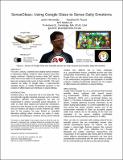SenseGlass: using google glass to sense daily emotions
Author(s)
Picard, Rosalind W.; Hernandez Rivera, Javier
DownloadPicard_SenseGlass.pdf (168.4Kb)
OPEN_ACCESS_POLICY
Open Access Policy
Creative Commons Attribution-Noncommercial-Share Alike
Terms of use
Metadata
Show full item recordAbstract
For over a century, scientists have studied human emotions in laboratory settings. However, these emotions have been largely contrived -- elicited by movies or fake "lab" stimuli, which tend not to matter to the participants in the studies, at least not compared with events in their real life. This work explores the utility of Google Glass, a head-mounted wearable device, to enable fundamental advances in the creation of affect-based user interfaces in natural settings.
Date issued
2014-10Department
Massachusetts Institute of Technology. Media Laboratory; Program in Media Arts and Sciences (Massachusetts Institute of Technology)Journal
Proceedings of the adjunct publication of the 27th annual ACM symposium on User interface software and technology - UIST'14 Adjunct
Publisher
Association for Computing Machinery (ACM)
Citation
Hernandez, Javier, and Rosalind W. Picard. “SenseGlass.” Proceedings of the Adjunct Publication of the 27th Annual ACM Symposium on User Interface Software and Technology - UIST’14 Adjunct (2014).
Version: Author's final manuscript
ISBN
9781450330688